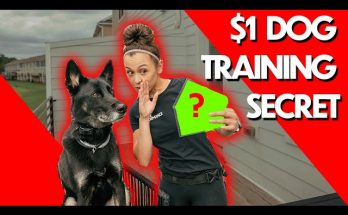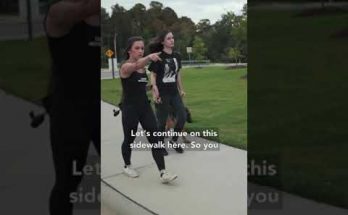PETFLOW'S *NEW* OFFER: Enter discount code ZAK30 at checkout to get $10 off your first THREE automatic shipments!!! http://petflow.com/zakgeorge
Find out how you can support content like this: http://www.Patreon.com/ZakGeorge
Like me on Facebook: http://www.Facebook.com/TheZakGeorge





My dog literally crashed through a window trying to get to me when I left without him yesterday. Poor pup cut his nose. Now that’s extreme anxiety.
Deke try a kennel?
@Jay Harvey i find that a stupid remark. If you have a dog you with take him to dogtrainer near you and get one on one training. He is a guideline not god. Get a grip
@SilverDirt Draws In places with extreme temperatures, like Texas, you can’t leave dogs outside all day. It gets over 100 degrees for most of July and August. Most people leave their dog in and let them out to potty on their lunch break, or hire someone to go check on them.
@atouk alunda lana my husky is the same. Once I left him in his crate and he manage to escape in under 20 mins.
Aww poor baby!! I hope he is ok!!
I hope you guys enjoy! Here’s a playlist that will show you how to teach your dog the basics in order: https://www.youtube.com/playlist?list=PLMssKIjsDxXmMGypWsr8u-yGOUSoPoozb Thanks for subscribing!
Zak George’s Dog Training Revolution My dog is 11 1/2 weeks old and hes a German Shepherd Lab Mix and he’s showing early signs of aggression, he doesn’t wanna be near me sometimes but than when I leave the room he goes absolutely insane he either pees in his kennel or he starts biting the metal bars viciously I try to tire him out before I put him in there but it doesn’t seem to do anything for him. He will sleep for random periods of time but if I get up he instantly wakes up and cries, he won’t pay attention during some training sessions and he only wants to bite me when I’m near. I have no clue what to do, and he honestly has me in a stage where I regret adopting him. 🙁 and it kills me to say that.
hi everyone ,if anyone else needs to find out about puppy training methods try Debuncar Perfect Dog Aid (do a google search ) ? Ive heard some decent things about it and my partner got great success with it.
Zak George’s Dog Training Revolution I desperately need help😭😭😭 plleeaaasssseeeee
@Jake Rocha Wish I would have seen this comment 2 years ago. Jack Rocha obviously doesn’t know what the hell he’s talking about. He probably beats his dog for not listening. Zak George is an excellent trainer. Rocha is just a hater.
my dogs separation anxiety is bad. if i go for a bath and he is right outside, in the dressing area he starts scratching and whining.
Honestly I have separation anxiety when i leave my dog…
Same
interesting points ,if anyone else trying to find out best way to train a puppy try Pycanta Puppy Trainer Protocol (just google it ) ? Ive heard some pretty good things about it and my cousin got cool success with it.
Me to lol
Sitting at the mall, and cant stop thinking about my gentle giant
Me too
I work at a doggy daycare and boarding, and there’s this dog who screeches for their owner the entire time. I usually spend the entire work day just petting him, holding him, teaching him to sit.
I feel like a dog can have separation anxiety without having any traumatic experiences and that it’s more of a pack mentality thing.
I could cry – thank you Zac! I’ve watched this video maybe 5 times in the past year as I’ve dealt with my babies extreme separation anxiety. I’ve tried big areas, his crate, I’ve tried kongs, CBD, thunder shirt, pheromones – EVERYTHING and nothing worked… UNTIL I rewatched this video this weekend and realized the key ingredient I was missing was to put him in a separate room (one he can’t see me leave from and is comfortable in). THIS HAS HELPED TREMENDOUSLY! He’s happy and calm and so far (knock on wood) his constant crying is little to none. So grateful for this advice! After a year of struggling I can finally leave the house again without worrying myself silly.
Assalamu Aalikum Courtney, I have watched this video couple times now and I haven’t noticed the advice you shared right now either, Thank you for pointing it out.
Having owned a dog with separation anxiety for 13 years (which two separate vets diagnosed as the worst case they had ever seen), I believe I have some first-hand knowledge of what works and doesn’t work. First, let’s translate this into something more relatable. Panic attacks…we’ve either heard of them, had them, or know someone who has experienced them. A friend who suffers from panic attacks once told me that she felt like she was dying during the attacks. Now imagine what your pet is feeling each and every time you leave home…welcome to separation anxiety. Separation anxiety is just a panic attack that your dog suffers each and every time you leave them. They come in different forms with varying degrees of stress, but make no mistake, these are doggie panic attacks.
Here is a list of what to do:
1. You need to make sure that your dog is thoroughly exercised. A tired dog has less anxious energy at the time of exposure to the triggers.
2. Watch for your own type of triggers. For example, walking around while grabbing keys, wallet, purse, jacket, etc. are cues to your dog that he/she should start getting anxious. You must desensitize your pet to these triggers. This takes time and dedication, so plan ahead before having to leave the house. Add an additional 30 minutes to your routine. During that time, pretend that you are leaving. Grab your keys and jacket, go to the door, open the front door, then close it and go sit down somewhere else in a calm fashion and remain there (reading, etc.) until your dog relaxes. Then repeat a few times at different intervals. Then start exiting the front door for a minute and then return. Ignore your pet at all times during this process. Your dog will come to you all happy to see you at first. Resist the temptation to acknowledge them. Each time increase the amount of time that lapses before reentering your home. Be sure to keep your pet guessing by leaving the third time one day and the fifth time another. Keep switching it up. That will keep your dog guessing and unable to ascertain when you are actually leaving. Be patient, this may take weeks before you see major improvements. However, if you stick with it, it will work! Your dog will stop getting anxious when you leave and when you return. As time goes by, begin reducing the time that you include in your routine before leaving until you just leave without any warning.
One important note…be sure you are calm (to the extent that it is possible) whenever leaving home. Dogs can literally read your emotional state by sensing your hormonal response to stimuli. If you are stressed and anxious…they will be too. Notwithstanding, keep in mind that any unexpected event may provoke an anxiety attack and you will then need to once again reinforce the routine. If your dog begins to regress, take a step back to examine what you are doing. Then begin the desensitization process once again. Even if your dog is not regressing, it’s good to still do these exercises from time to time to reinforce the good behavior. Conversely, if your dog continues to regress, you need to look in the mirror as you will most likely be the cause of the regression. Sometimes we fall into patterns of behavior that inadvertently send signals out to our dog. Low energy/calm routines are the best ways to keep fido relaxed.
3. DO NOT GIVE YOUR DOG loves when he/she is in an excited state. Similarly, DO NOT OVERDO the loves. This is perhaps one of the hardest things that I had to learn. Our instinct is to shower our pet with love. However, this is disastrous with dogs that have separation anxiety. You need to give them love, but only when they are calm and in small doses. If they become too excited, you need to back away until they calm down. If they begin to regress, you need to take an honest assessment of how much affection you are giving your dog. It seems counter-intuitive at first, but you will recognize that your dog will be happier and less anxious with fewer huggies and kisses from you. If you ignore this advice, you will be unwittingly reinforcing their anxiety.
4. When coming home, DO NOT engage your pet for a good 15-30 minutes. Come into your home and go about your business completely ignoring them. He/She will be hyper-excited, so it is critical that you don’t reinforce this behavior by giving them loves at that time. Wait until they are calm and then give them some brief attention and go about your business.
5. You must take steps to ensure that your dog is not always in the same room as you. Some dogs with separation anxiety exhibit velcro behavior. That is, they will be right by your side at all times. They will lay at your feet at any given moment if given the opportunity. Others will lay in different parts of the same room, but always staring at you or sleeping with their head aimed in your direction. It is important to not encourage this behavior and you MUST put your dog in a different room and/or out of your sight so that they can learn to become relaxed outside your field of view.
After many…many trials and failures, I came up with a formula that worked well with my dog. It minimized the anxiety to an acceptable level and the episodes of destruction and injury greatly diminished. However, they never went away completely. Just like you don’t cure autism, you don’t cure separation anxiety; you just learn to work with it and make your pet’s life as enjoyable and stress-free as possible. I know that even after years of conditioning, an unexpected knock at the door, a strange noise, etc., when away from home can trigger a response. Such is life when owning a dog with separation anxiety.
As long as you fulfill their needs before your own, you will have a happy pet.
P.S. I know some will ask about medication. I went that route for short while but abandoned it after realizing that the only way to control the behavior with medicine was to use it at levels which greatly diminished her quality of life. That was a tradeoff I was not willing to make. Anti-depressants like Clomipramine did not work for us and neither did benzodiazepines like alprazolam (Xanax). Though not particularly successful in my case, there are some reports of the successful use of medication and behavioral modification (as described above) to help control the anxiety. Each dog will respond differently. Unfortunately, my dog was not a good candidate for this approach, but it is worth taking a look at this method if your dog reacts favorably to the medication.
Thus advice more informative than the video it self. Thank you wil help me alot
I am definitely going to try this..everything you said makes total sense.. do you have training videos?
Great advice. I’ll copy and paste
Thankyou so much for this xx
How much is too much
my dog just sits on the sofa quietly, when we come home he goes crazy.
One of my dogs have this. Whenever I go to pet my Labrador my chihuahua attacks him. And if I go for two minutes she starts crying and howling
Get rid of your chihuahua
@Ali 21 no she shouldnt she needs to ignore her dog completely are go to the vet
@Yasmine D if she has separation anxiety that won’t go well
My 2 rotts couldn’t give a s. when I leave or when I arrive.
Lmfao lucky u
It really does help to have two dogs 🐶🐶
lorenzo magazzeni 😆😆🤪🤪🥳🤪
On the other hand my dog has almost destroyed the front door from her anxiety. (She is a mix breed of a rott and german shepherd :p)
That’s awesome. They are confident and they trust you. My dog causes himself pain and goes through tremendous mental and emotional turmoil when I leave. He does not trust me to come back because he was surrendered 3 times before I adopted him.
Just got a new puppy and his anxiety gives me anxiety. I can’t even go to the bathroom without him freaking out. My kids take turn sleeping on the couch because he needs to be with someone. He is an 11 week old Siberian husky. I hope this video helps me a bit. Thank you!
I have to bring our pup w me even in the bathroom as I take a bath cause she just cries and barks endlessly😩
She’s a 13 week old puppy and she cries so hard when I leave and scratches at the door. It’s heartbreaking and I feel so bad.
You really should not leave a puppy that young home alone for long…. how is it going now? I also have a 13 week old puppy with the same problems now
She is only home alone for like 4 hours. I come home from work on my breaks every day.
It was precious when colston was left alone but zak decided to give him comfort because he couldn’t stand his stress
I’ve had my puppy for less than a week and already she’s sticks to me like glue and howls and cries when left alone 🙁
Same
Just curious, after 1 year, does it go better? or is she more and more attached to you?
Grace Zhang she mostly avoids me now 😂
@rusty lol what changed? is it just a phase?
Grace Zhang she was very clingy in the beginning but now she’s quite independent. But usually at least two three times per day demands pats and cuddles or she gets cranky.
I stay in an apartment and my dog he is 1year old now but he still whines or cries the entire time he’s alone… he won’t keep quiet for a second
Omg,my dogs is the same,he follows me everywhere “every step you take, every move you make, I’ll be watching you”
Dani Meneghello bahahah
🤣🤣🤣
He whines, barks and squeaks. Then when I return he loseshos mind running back and forth and tons of kisses
My dog Barks and whimpers like crazy when I leave her alone. Even if I sit in front of her when she is in her X—pen! I think you should make a video about that,
My dog really tried to yeet herself out the window when she saw my mom leave lol
anyone else here because their pandemic puppy cries whenever you leave them alone?